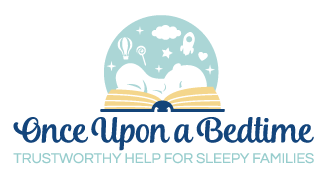About:
Sarah Christian is an infant and child sleep consultant who loves helping families get the rest they need. In addition to her certification from the Family Sleep Institute, Sarah has an insatiable appetite for reading sleep research. This is fueled by a master’s degree in library science and twenty years of work in the Penn State University Libraries. Her own three children keep it real, and along with her husband Dean are the joys of her life.
Send her an email with your questions: sarah@onceuponabedtime.com
Or read more at onceuponabedtime.com.
Where should baby sleep?
The AAP recommends that for baby’s first six months, parents room-share without bed-sharing with their infant. The most dangerous place for a baby to sleep in terms of SIDS risk is on a sofa. If a parent is concerned about falling asleep while caring for baby during the night, it is better to clear the parent’s bed of any pillows, blankets, or soft bedding while feeding. If you fall asleep with your baby in your bed next to you, place your baby back in his crib or bassinet once you wake.
What about reflux?
Babies are born with an underdeveloped valve between the esophagus and the stomach, making some reflux a completely normal thing, affecting about 40% of babies. Holding baby semi-upright for several minutes after a feeding can make him more comfortable lying down to sleep. Continue to place baby on his back to sleep.
What if my baby rolls over in his sleep?
Always put your baby to sleep on his back. Many babies become more comfortable and sleep better once they are able to roll to a position they like. Once your baby is rolling independently, it is safe for him to sleep on his tummy if he so chooses.
Will teething wreck my baby’s sleep?
Teething is a constant process during much of baby’s first year. Active teething is relatively short though, lasting only 2-4 days before the tooth erupts, with the main signs being drooling, biting, and irritability. It does not cause a fever or severe symptoms.
Will starting solid food lengthen my baby’s sleep?
No. Recent evidence suggests that the early introduction of solids may help babies sleep longer, but the difference was an extra 16 minutes at most, and may have been due to other factors aside from beginning solid foods. Earlier research found no difference in sleep when parents gave baby rice cereal before bedtime. Check with your pediatrician before adding solid foods to your baby’s diet.
How to Help Newborns Sleep Better
Keep awake times short: about 45-60 minutes during the first few weeks. Keeping baby awake for longer will make it harder for baby to drift off to sleep. Between 2-5 months of age, aim for 90 minutes awake between naps.
A snug swaddle often helps babies sleep better. Keep the arms wrapped securely; the swaddle is less about wrapping the torso and legs. It is critically important to stop swaddling before baby is able to roll independently.
Pacifiers are soothing for baby and have been shown not to interfere with breastfeeding.
White noise is calming and is safe for baby’s ears when kept to about the noise level of a bathroom shower.
Lots of natural daylight exposure will help your baby begin to distinguish day from night. Keep nighttime interactions dim and uninteresting to minimize wakefulness at night.
Bedtime routines help babies fall asleep easier, wake less often and for a shorter length of time, and sleep longer. They are the most consistently beneficial way to help your baby sleep well. Create a routine that stays the same every night, for example: milk, bath, lotion, bed.
Pause for one minute before feeding baby when he wakes at night. Consistently doing this avoids responding when he wasn’t really awake, and leads to longer sleep as he grows.
